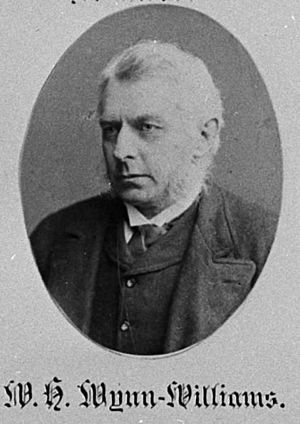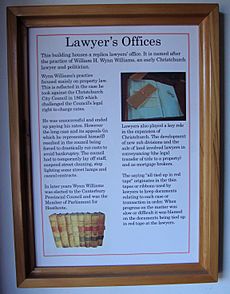Henry Wynn-Williams facts for kids
Quick facts for kids
Henry Wynn-Williams
|
|
|---|---|

Henry Wynn-Williams in 1882
|
|
| Member of the New Zealand Parliament for Heathcote |
|
| In office 1881–1884 |
|
| Personal details | |
| Born | 1828 Llansannan Wales |
| Died | 27 October 1913 |
| Relations | Watkin Williams (brother) |
| Occupation | lawyer |
William Henry Wynn-Williams (born 1828, died 1913) was an important person in New Zealand's history. He was a Member of Parliament for the Canterbury region. He was also a very well-known lawyer in Christchurch.
Contents
Early Life and Moving to New Zealand
William Wynn-Williams was born in August 1828 in a place called Llangar in North Wales. His father was Peter Williams, a rector (a type of church leader). William had a brother named Watkin Williams.
William first trained to join the Indian army. However, he later decided to study law instead. After working as a lawyer in Wales for two years, he moved to New Zealand. He arrived in Wellington in 1856. For a few years, he worked on farms in the South Island. Then, in 1860, he settled in Christchurch.
Becoming a Lawyer in New Zealand

William Wynn-Williams started his law career in New Zealand in July 1860. He joined a law firm that Harry Bell Johnstone had started. Johnstone left the firm in 1864, but Wynn-Williams stayed. He worked there until 1912. The law firm he was part of, now called Wynn Williams & Co, still exists today!
As a lawyer, he handled many different types of cases. He helped people buy and sell property. He also worked on court cases and important civil disputes. People described him as brave and fearless. He often helped people who were not very powerful.
Political Career
William Wynn-Williams was also active in politics. He believed in standing up for what he thought was right.
Fighting for Ratepayers
He was part of a group called the Ratepayers' Mutual Protection Association. This group questioned if the Christchurch City Council had the right to exist. Wynn-Williams took their concerns to court.
Because of this, some people stopped paying their rates (local taxes). In April 1866, the City Council had to cut its spending a lot. They laid off staff, stopped cleaning streets, and turned off some streetlights. A big project to improve drainage in the city was also cancelled. Wynn-Williams eventually lost this long court case. After that, the Ratepayers' Mutual Protection Association stopped operating.
Serving on the Provincial Council
Wynn-Williams was a member of the Canterbury Provincial Council. This was a local government body before New Zealand had a single national government. He served from 1865 until this type of government ended. He represented different areas during his time on the council.
Becoming a Member of Parliament
| New Zealand Parliament | ||||
| Years | Term | Electorate | Party | |
| 1881–1884 | 8th | Heathcote | Independent | |
In the 1881 general election, William Wynn-Williams ran for the Heathcote area. He won the election and became a Member of Parliament.
Wynn-Williams was known for supporting working-class people. Even a conservative newspaper called The Press praised him in 1883. They admired him for speaking his true opinions. They said he was honest and brave, unlike some other politicians who just said what people wanted to hear.
His great-grandson, Robert Wynn-Williams, even used this newspaper article as inspiration for the title of a book he wrote about him.
In the 1884 general election, Wynn-Williams ran for Heathcote again. However, he lost to John Coster.
Community Work
Besides his work as a lawyer and politician, Wynn-Williams was involved in his community. He was on the council of the Canterbury Society of Arts. This group organized exhibitions to show off paintings and other artworks. In 1881, he was the vice-president of this organization.
Death
William Henry Wynn-Williams passed away on 27 October 1913. He was buried at Barbadoes Street Cemetery in Christchurch.

